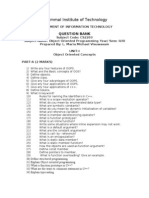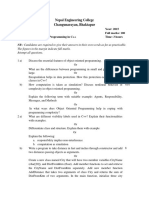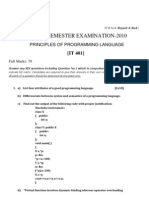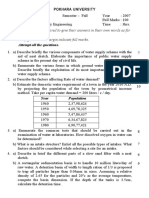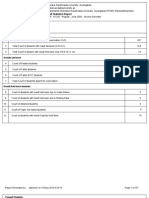0 ratings0% found this document useful (0 votes)
63 viewsObject Oriented Programming
This document provides the details of an Object Oriented Programming exam for a Bachelor's program at Pokhara University. It includes 7 questions testing concepts like object orientation vs structured programming, object-oriented design principles like CRC cards, operator overloading, inheritance, polymorphism, templates and more. Students are required to answer all questions in their own words and the exam is worth a total of 100 marks to be completed within 3 hours.
Uploaded by
sushilCopyright
© © All Rights Reserved
We take content rights seriously. If you suspect this is your content, claim it here.
Available Formats
Download as DOC, PDF, TXT or read online on Scribd
0 ratings0% found this document useful (0 votes)
63 viewsObject Oriented Programming
This document provides the details of an Object Oriented Programming exam for a Bachelor's program at Pokhara University. It includes 7 questions testing concepts like object orientation vs structured programming, object-oriented design principles like CRC cards, operator overloading, inheritance, polymorphism, templates and more. Students are required to answer all questions in their own words and the exam is worth a total of 100 marks to be completed within 3 hours.
Uploaded by
sushilCopyright
© © All Rights Reserved
We take content rights seriously. If you suspect this is your content, claim it here.
Available Formats
Download as DOC, PDF, TXT or read online on Scribd
You are on page 1/ 2
POKHARA UNIVERSITY
Level: Bachelor Semester – Spring Year : 2006
Programme: BE Full Marks: 100
Course: Object Oriented Programming in C++ Time : 3hrs.
Candidates are required to give their answers in their own words as far
as practicable.
The figures in the margin indicate full marks.
Attempt all the questions.
1. a) What is object orientation? Explain the difference between structured 7
and object oriented programming approach.
b) What is the role of behavior in OOP? Along with a figure and an 8
example of a CRC card, explain its significance in object oriented
Design.
2. a) What is the difference between message passing and function 8
call? Explain the basic message passing formalism.
b) What is a constructor? Is it mandatory to use constructor in a class? 7
Explain.
3. a) You are given a class Complex and a main program below: 10
class Complex{
void main()
float re, im; {
//To represents complex number eg. 5+i10 Complex C1 (4,5);
Complex C2(3,3);
public: Complex (float x, float y) Complex C3;
{re=x; im=y;} C3=C1+C2;
void show ( ) {cout<<re<<" +i "<<im;} C3.show( );
};
}
What do you mean by operator overloading? How do you overload
the + operator in main program (C3=C1+C2) so that C3 can store a
complex number obtained by adding C1 and C2.
b) What is the role of static data in C++ classes? Give example.
5
4. a) "Inheritance allows us to create a hierarchy of classes." Justify this 7
statement. Discuss the private and public inheritance.
b) Develop a complete program for an institution, which wishes to 8
maintain a database of its staff. The database is divided into number
of classes whose hierarchical relationship is shown in the following
diagram. Specify all the classes and define constructors and functions
to create database and retrieve the individual information as per the
requirements.
STAFF
Staff_ID
Name
LECTURER ADMINISTRATIVE LIBRARIAN
Subject STAFF Shift
Department Post Department
5. a) Distinguish between a subclass and a subtype in light of the principle of 8
substitutability. Support your answer with example.
b) Discuss the role of virtual functions in C++ to cause dynamic
polymorphism. Show with example the how it is different from the
compile time polymorphism. 7
6. a) What is an abstract class? How does it differ from a virtual base class? 2+5
Explain.
b) What is generic programming? How would you convert regular 2+6
classes into templates? Explain with an example.
7. Write short notes on (Any Two): 52
a) Friend function
b) Deferred methods
c) Hybrid inheritance
d) Abstraction
You might also like
- Advanced C++ Interview Questions You'll Most Likely Be AskedFrom EverandAdvanced C++ Interview Questions You'll Most Likely Be AskedNo ratings yet
- VTU-14-01-2019 01:41:02pm: TG - TG - TG - TG - TG - TG - TG - TG - TGNo ratings yetVTU-14-01-2019 01:41:02pm: TG - TG - TG - TG - TG - TG - TG - TG - TG2 pages
- Question Paper 2021 Introduction To Object Oriented ProgrammingNo ratings yetQuestion Paper 2021 Introduction To Object Oriented Programming4 pages
- Object Oriented Programming With C++ Jan 2014No ratings yetObject Oriented Programming With C++ Jan 20141 page
- Sample Question Paper: Employee Employee Name, Employee ID Getdata, PutdataNo ratings yetSample Question Paper: Employee Employee Name, Employee ID Getdata, Putdata7 pages
- Be - Electronics and Telecommunication Engineering - Semester 4 - 2022 - November - Object Oriented Programming Oop Pattern 2019No ratings yetBe - Electronics and Telecommunication Engineering - Semester 4 - 2022 - November - Object Oriented Programming Oop Pattern 20192 pages
- University of Central Punjab: Faculty of Information TechnologyNo ratings yetUniversity of Central Punjab: Faculty of Information Technology6 pages
- Cse2001 Object-Oriented-programming-with-c++ LTP 1.1 58 Cse2001 Object Oriented Programming With C++ LTP 4 v1.1No ratings yetCse2001 Object-Oriented-programming-with-c++ LTP 1.1 58 Cse2001 Object Oriented Programming With C++ LTP 4 v1.13 pages
- Candidates Are Required To Give Their Answers in Their Own Words As Far As Practicable. The Figures in The Margin Indicate Full MarksNo ratings yetCandidates Are Required To Give Their Answers in Their Own Words As Far As Practicable. The Figures in The Margin Indicate Full Marks2 pages
- Object Oriented Programming Jan 2017 (2010 Scheme)No ratings yetObject Oriented Programming Jan 2017 (2010 Scheme)2 pages
- Questions and Answers For Object Oriented Progamming in C++No ratings yetQuestions and Answers For Object Oriented Progamming in C++77 pages
- Object Oriented Programming Concept by Using C++ (CSEN 3208)No ratings yetObject Oriented Programming Concept by Using C++ (CSEN 3208)3 pages
- Object Oriented Programming in C++ (New)No ratings yetObject Oriented Programming in C++ (New)2 pages
- C# Fundamentals Made Simple: A Practical Guide with ExamplesFrom EverandC# Fundamentals Made Simple: A Practical Guide with ExamplesNo ratings yet
- Candidates Are Required To Give Their Answers in Their Own Words As Far As Practicable. The Figures in The Margin Indicate Full MarksNo ratings yetCandidates Are Required To Give Their Answers in Their Own Words As Far As Practicable. The Figures in The Margin Indicate Full Marks2 pages
- Steel Moment-Resisting Frame 1994 Northridge Earthquake Federal Emergency Management AgencyNo ratings yetSteel Moment-Resisting Frame 1994 Northridge Earthquake Federal Emergency Management Agency1 page
- Candidates Are Required To Give Their Answers in Their Own Words As Far As Practicable. The Figures in The Margin Indicate Full MarksNo ratings yetCandidates Are Required To Give Their Answers in Their Own Words As Far As Practicable. The Figures in The Margin Indicate Full Marks2 pages
- Candidates Are Required To Give Their Answers in Their Own Words As Far As Practicable. The Figures in The Margin Indicate Full MarksNo ratings yetCandidates Are Required To Give Their Answers in Their Own Words As Far As Practicable. The Figures in The Margin Indicate Full Marks2 pages
- Candidates Are Required To Give Their Answers in Their Own Words As Far As Practicable. The Figures in The Margin Indicate Full MarksNo ratings yetCandidates Are Required To Give Their Answers in Their Own Words As Far As Practicable. The Figures in The Margin Indicate Full Marks2 pages
- Candidates Are Required To Give Their Answers in Their Own Words As Far As Practicable. The Figures in The Margin Indicate Full MarksNo ratings yetCandidates Are Required To Give Their Answers in Their Own Words As Far As Practicable. The Figures in The Margin Indicate Full Marks2 pages
- Candidates Are Required To Give Their Answers in Their Own Words As Far As Practicable. The Figures in The Margin Indicate Full MarksNo ratings yetCandidates Are Required To Give Their Answers in Their Own Words As Far As Practicable. The Figures in The Margin Indicate Full Marks2 pages
- Candidates Are Required To Give Their Answers in Their Own Words As Far As Practicable. The Figures in The Margin Indicate Full MarksNo ratings yetCandidates Are Required To Give Their Answers in Their Own Words As Far As Practicable. The Figures in The Margin Indicate Full Marks2 pages
- Candidates Are Required To Give Their Answers in Their Own Words As Far As Practicable. The Figures in The Margin Indicate Full MarksNo ratings yetCandidates Are Required To Give Their Answers in Their Own Words As Far As Practicable. The Figures in The Margin Indicate Full Marks2 pages
- Candidates Are Required To Give Their Answers in Their Own Words As Far As Practicable. The Figures in The Margin Indicate Full MarksNo ratings yetCandidates Are Required To Give Their Answers in Their Own Words As Far As Practicable. The Figures in The Margin Indicate Full Marks2 pages
- Candidates Are Required To Give Their Answers in Their Own Words As Far As Practicable. The Figures in The Margin Indicate Full MarksNo ratings yetCandidates Are Required To Give Their Answers in Their Own Words As Far As Practicable. The Figures in The Margin Indicate Full Marks2 pages
- Candidates Are Required To Give Their Answers in Their Own Words As Far As Practicable. The Figures in The Margin Indicate Full MarksNo ratings yetCandidates Are Required To Give Their Answers in Their Own Words As Far As Practicable. The Figures in The Margin Indicate Full Marks2 pages
- Candidates Are Required To Give Their Answers in Their Own Words As Far As Practicable. The Figures in The Margin Indicate Full MarksNo ratings yetCandidates Are Required To Give Their Answers in Their Own Words As Far As Practicable. The Figures in The Margin Indicate Full Marks2 pages
- Candidates Are Required To Give Their Answers in Their Own Words As Far As Practicable. The Figures in The Margin Indicate Full MarksNo ratings yetCandidates Are Required To Give Their Answers in Their Own Words As Far As Practicable. The Figures in The Margin Indicate Full Marks2 pages
- Cliquez Ici Pour Regarder Le Cours en FrançaisNo ratings yetCliquez Ici Pour Regarder Le Cours en Français5 pages
- Fly Level Booking Sheet Project:-Location:-: S.no BS IS FS Rise Fall HI Reduced LevelNo ratings yetFly Level Booking Sheet Project:-Location:-: S.no BS IS FS Rise Fall HI Reduced Level2 pages
- AirWatch Install Requirements Guide For SaaS v7 0No ratings yetAirWatch Install Requirements Guide For SaaS v7 03 pages
- p013668 - Why Are Customers Choosing Power Systems Instead of x86No ratings yetp013668 - Why Are Customers Choosing Power Systems Instead of x8650 pages
- Internal Combustion Engines Heywood Chapter 3 Solution PDFNo ratings yetInternal Combustion Engines Heywood Chapter 3 Solution PDF2 pages
- Operations Research (Me 705C) MCQS: Max Z 30x - 15x, S.T. 2x - 2x 0100% (4)Operations Research (Me 705C) MCQS: Max Z 30x - 15x, S.T. 2x - 2x 010 pages
- Boarding Pass: Name Booking Code Ticket NoNo ratings yetBoarding Pass: Name Booking Code Ticket No1 page
- Decoupling Fine Detail and Global Geometry For Compressed Depth Map Super-ResolutionNo ratings yetDecoupling Fine Detail and Global Geometry For Compressed Depth Map Super-Resolution10 pages
- Rank, Row-Reduced Form, and Solutions ToNo ratings yetRank, Row-Reduced Form, and Solutions To11 pages
- SGCertified Integration Architecture Designerstudyguide 1No ratings yetSGCertified Integration Architecture Designerstudyguide 113 pages
- Tutorial HYSWEEP EDITOR Untuk Pengolahan Data Multibeam Echosounder0% (1)Tutorial HYSWEEP EDITOR Untuk Pengolahan Data Multibeam Echosounder76 pages






